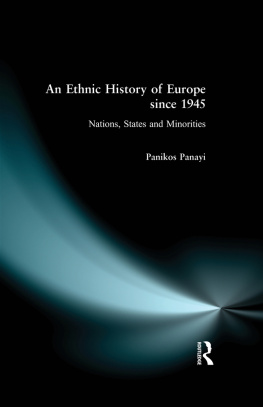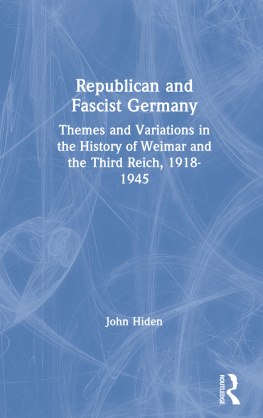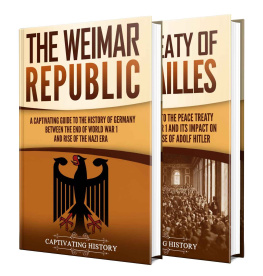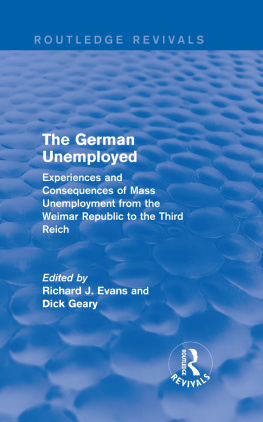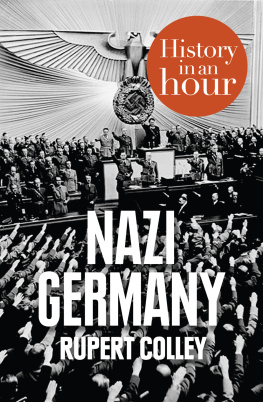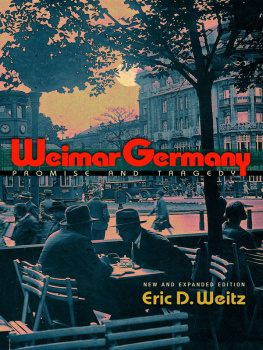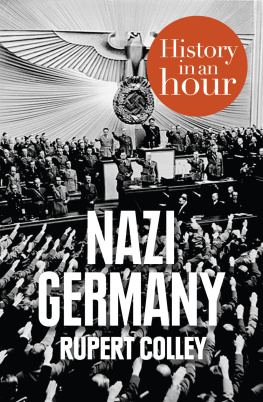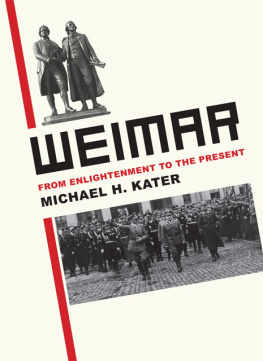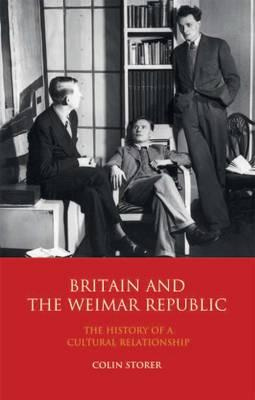WEIMAR AND NAZI GERMANY
First published 2001 by Pearson Education Limited
Published 2014 by Routledge
2 Park Square, Milton Park, Abingdon, Oxon 0X14 4RN
711 Third Avenue, New York, NY 10017, USA
Routledge is an imprint of the Taylor & Francis Group, an informa business
Copyright 2001, Taylor & Francis.
All rights reserved. No part of this book may be reprinted or reproduced or utilised in any form or by any electronic, mechanical, or other means, now known or hereafter invented, including photocopying and recording, or in any information storage or retrieval system, without permission in writing from the publishers.
Notices
Knowledge and best practice in this field are constantly changing. As new research and experience broaden our understanding, changes in research methods, professional practices, or medical treatment may become necessary.
Practitioners and researchers must always rely on their own experience and knowledge in evaluating and using any information, methods, compounds, or experiments described herein. In using such information or methods they should be mindful of their own safety and the safety of others, including parties for whom they have a professional responsibility.
To the fullest extent of the law, neither the Publisher nor the authors, contributors, or editors, assume any liability for any injury and/or damage to persons or property as a matter of products liability, negligence or otherwise, or from any use or operation of any methods, products, instructions, or ideas contained in the material herein.
ISBN 13: 978-0-582-32780-1 (pbk)
British Library Cataloguing-in-Publication Data
A catalogue record for this book can be obtained from the British Library
Library of Congress Cataloging-in-Publication Data
A catalog record for this book can be obtained from the Library of Congress
CONTENTS
Panikos Panayi
Richard Overy
Hartmut Berghoff
Edgar Feuchtwanger
Imanuel Geiss
J. Adam Tooze
Lisa Pine
Panikos Panayi
Lee McGowan
Stefan Berger
G.T. Waddington
The publishers wish to thank the following for permission to reproduce the following material:
from A History of Germany 18151990, 4th edition, (William Carr, 1991), reproduced by permission of Arnold Publishers.
Extract from speech by Otto Wels (translated by Stefan Berger) from Stenograpische Berichte ber die Verhandlungen des Deutschen Reichstages, Vol. 457 (1933) pp. 3224 with permission of Bundesarchiv, Berlin.
This may represent yet another book on Germany under the Weimar Republic and the Third Reich, but it does take an interesting approach, which has several novel features. First, authors were asked to examine not only the continuities and discontinuities between inter-war Germany and the years before and after, but also between Weimar and Nazi Germany. Second, the structure of the book divides into two sections after my introductory essay. The articles in the second part consist of outlines of the economic, social, political and diplomatic history of Germany between 1919 and 1945. The third section contains a variety of essays on specific aspects of the economic, social, political and diplomatic history of the Federal Republic, many of them based on original archival research. The authors consist of a mixture of some of the most important historians of Germany in the last four decades, a selection of some of those who are currently establishing themselves as leading authorities on Germany, and a few who have just started out on their academic careers.
My introductory essay sets the agenda for the articles that follow, pointing to the historical background, the links and breaks between Weimar and Nazi Germany and the legacy of the years between 1919 and 1945 on the Federal Republic and the German Democratic Republic. I consider economic, social, political and diplomatic developments.
, by Imanuel Geiss, consists of a detailed examination of the diplomacy of Germany under the Weimar Republic and the Third Reich by contextualizing it within the foreign policy of the Kaiserreich
The third section on specific themes within the history of Germany between 1919 and 1945 opens with an essay by Adam Tooze, Big Business and the Continuities of German History, which is both a historical and a historiographical piece examining several aspects of German business history between 1900 and 1945. There then follow two essays on the social history of Weimar and Nazi Germany. Lisa Pines article on Women and the Family utilizes the latest lines in research on this subject to examine the racist ways in which the Nazis tackled issues such as eugenics, marriage and family welfare. Similarly, my own essay on Continuities and Discontinuities in Race examines the differing methods by which both Weimar and Nazism excluded Jews, gypsies and Slavs. There are then two articles on aspects of the political history of Germany between 1919 and 1945. Lee McGowan examines both the ideology and the reality of Nazism, while Stefan Berger tackles the SPD both before 1933 and under the Nazis, contextualizing the events of these years in developments in the partys history both before 1919 and after 1945. Finally, G.T. Waddingtons article is an original primary source-based examination of Anglo-German relations between 1919 and 1939, one of the few essays written on this subject.
It is hoped that the book will appeal to the student, the general reader and the specialist on German history. The editor would like to thank all of the contributors for their promptness in delivering their essays and the effort they put into their individual pieces. He would also thank the Longman editors who took on the project in the form of Andrew MacLennan, who commissioned it, and Emma Mitchell, who saw it to fruition.
Panikos Panayi
Oadby, Leicestershire
October 1999
Stefan Berger was born in Langenfeld/Rhineland in 1964. He studied history, political science and literature at the universities of Cologne and Oxford. In 1991 he obtained his DPhil from the University of Oxford. He is currently Professor of History at the University of Glamorgan. His major research interests are in the areas of comparative labour history and historiography. More recently he has published Social Democracy and the Working Class in Nineteenth and Twentieth Century Germany (London, 2000); ed. with Angel Smith, Labour, Nationalism and Ethnicity, 18701939 (Manchester, 1999); ed. with Mark Donovan and Kevin Passmore, Writing National Histories: Western Europe Since 1800 (London, 1999); and The Search for Normality: National Identity and Historical Consciousness in Germany Since 1800 (Oxford, 1997). His current projects include a book entitled From Radical Nationalism to Postnationalism? The Invention of German National Identities in the Nineteenth and Twentieth Centuries.
Hartmut Berghoff was born in Herford in Germany in 1960 and studied in Bielefeld, Berlin and London. He is a Privatdozent at the University of Tbingen where he teaches modern history and economic history. His 1989 Bielefeld PhD thesis on the social history of British businessmen before the First World War appeared as Englische Unternehmer, 18701914: Eine Kollektivbiographie fhrender Wirtschaftsbrger in Birmingham, Bristol und Manchester (Gttingen, 1991). His other major books include: Zwischen Kleinstadt und Weltmarkt: Hohner und die Harmonika, 1857 bis 1961: Untemehmensgeschichte als Gesellschaftsgeschichte


